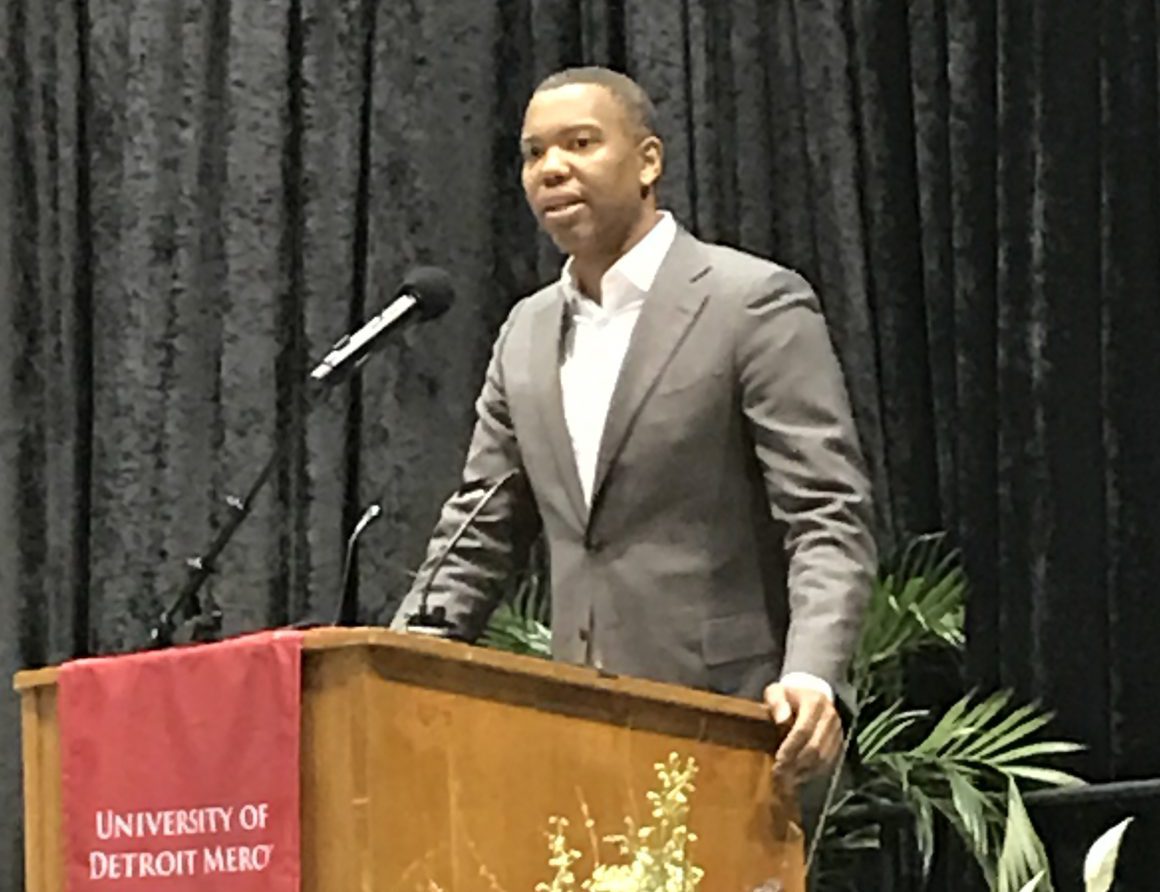
And that is no small feat…
There’s a reason why celebrated author/intellectual Toni Morrison has pointed to (much younger) fellow author/intellectual Ta-Nehisi Coates as the logical successor to the famed author/activist James Baldwin, and that reason was evident Tuesday evening when Coates gave a lecture to a packed house at University of Detroit Mercy’s Calihan Hall. The fact that so many hundreds made the trek to listen to a lecture on race was evidence enough of the sort of fame and recognition Coates has earned in recent years, even before the 2015 publication of his acclaimed book, Between the World and Me.
The staff writer for the Atlantic Monthly has established himself as a force to be reckoned with in both literary and intellectual circles. His Atlantic article on “The Case for Reparations”, written in 2014, delivered one of the most cogent, well-researched, well-documented and rational arguments for why African Americans should be entitled to some form of compensation from the U.S. government that has taken so much from them over so many years (black people in America were enslaved longer than we have been free, he pointed out). Not surprisingly, seeing as how the Atlantic offers Coates a significantly higher profile than most other journalists, his views have prompted reactions and discussions on a much higher level than just about any other African American writer in existence today.
The fact that Coates is not merely willing but feels himself compelled to tackle the controversial subject of race – especially in times such as these – has only elevated his profile, while also positioning him as somewhat of a figure for target practice. And not only from the right wing, since Coates has come under blistering criticism more than once from fellow intellectual Cornel West, who angrily challenged Morrison for saying Coates should be the one to inherit Baldwin’s mantle. No doubt, at least to some degree, because West figures that one ought to go to him. The fact that Coates declined to join West and Tavis Smiley in their obsessive and vitriolic attacks against President Barack Obama, but opted instead for reasoned criticism, didn’t help the relationship much either.
But academic cat fighting aside, a big part of Coates’ public appeal, I would imagine, comes from the way he presents himself, which is not as any sort of pompous buttoned down stuffed shirt full of his own self importance, but as an extremely down-to-Earth and approachable young black man who, as he says himself, asks a lot of questions and doesn’t stop until he gets the answers he’s looking for. He is also one who criticizes his own journalistic colleagues for too often failing to be students of history, which consequently feeds into uninformed and inaccurate reporting when it comes to subjects of race and culture, and just about any other subject requiring context.
“I don’t know what the requirements are to graduate from the U of D Mercy but it should be a requirement that you spend some time in your history department,” he said, then added, “That should be a requirement everywhere.”
For example, those who know their history know that the argument for reparations is hardly brand new.
“The case for reparations is really as old as the country itself,” he said.
Coates spent the majority of time during his remarks making the case not so much about reparations directly, but about what it means to be black in America today, and reciting a list of harrowing statistics related to the yawning gap between white and black wealth (Talking about the difference between black wealth and white wealth, Coates said that in 2014, when he wrote The Case for Reparations, “for every nickel of wealth the average black family had, white families had a dollar. The gap is 20 to 1.”), and between white neighborhoods and black neighborhoods (Ron Sampson a Harvard sociologist “says that the difference between black neighborhoods and white neighborhoods is so much that you’re talking about a difference in ecology”). Coates singled out his time spent in Detroit as a younger journalist, before fame found him, as an experience that helped shape his views on race, existence and survival in America.
“Back around 2009 or so there was a lot of reporting around Detroit. …And you would see stories about how Detroit has fallen and Detroit was ruins and Detroit was like a 3rd world country. I’m from Baltimore and I know about those sorts of plights, but there was something about those stories that really bugged me, and I could not put a finger on it. It was a kind of incompleteness that I couldn’t quite get at,” he said.
As he got to know and experience Detroit, it became clear that this ‘incompleteness’ came from the purposefully incomplete way in which Detroit was being portrayed to the rest of the country and the world. His first visit to the upscale Palmer Woods neighborhood really brought that lesson home in a jarring way.
“That is a gorgeous neighborhood. I mean just beautiful. And I said ‘Jesus, look at these houses, they are incredible! And you never see that. I didn’t even know that was here. And I was so impressed by the resiliency of folks who lived in those neighborhoods and the pride they took and their willingness to hold on to those neighborhoods.
“During my time in Detroit I was learning, and I was learning the right questions to ask. And one of my questions was why aren’t there more Palmer Woods? Not just in Detroit, but in this cities of America. Why weren’t there more neighborhoods like that? Was it something in the water? Was it something genetic in Palmer Woods? What was it?”
It’s just Detroit, baby. It’s just Detroit.
Author Ta-Nehisi Coates attracts crowd of over 4,000 to lecture on race


